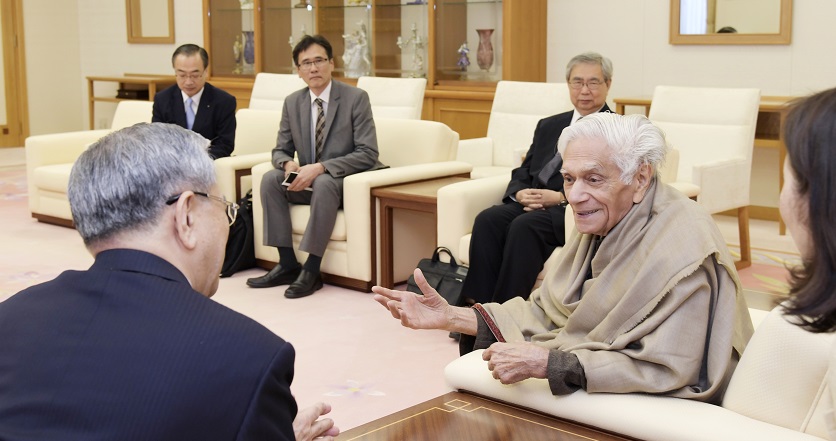Securing the Peace of the Land

If we truly believe in the inherent dignity of life, we would value our own lives and those of others. Addressing suffering and preventing violence would become the highest priorities of humankind. Instead, our global community is rife with preventable misery, inequality and injustice. Nichiren understood that change in the world must begin with change in the hearts of individuals.
During his lifetime, a series of disasters—earthquakes, floods, pandemics and fire—had devastated the country. The sufferings of ordinary people were enormous. His determination to uncover the fundamental causes of this misery and turmoil drove him to study and analyze the underlying belief structures of society. He set forth his conclusions in the form a treatise titled “On Establishing the Correct Teaching for the Peace of the Land,” which he presented to the political ruler on the sixteenth day of the seventh month, 1260. Considered Nichiren’s most important treatise, this was a passionate cry for a return to the original purpose of Buddhism—the happiness of the people in present and future existences, the prerequisite for this being a society at peace. For Nichiren, this was an objective that could only be achieved through a philosophy that rigorously upholds the infinite dignity and potential of each individual.
Nichiren understood that change in the world must begin with change in the hearts of individuals.
Specifically, he was critical of those Buddhist schools whose teachings he felt disempowered people by instilling a passivity in the face of personal and social challenges.
He felt that the disorder evident in the world reflected disorder within human beings. As he wrote, “In a country where the three poisons [of greed, anger and foolishness] prevail to such a degree, how can there be peace and stability?” He highlighted the causal relationship between these destructive human impulses and the pervasive realities of conflict, famine and epidemics.
He was convinced that only Buddhism could give people the strength to overcome these spiritual poisons in their lives, but as a result of wide-ranging study, he concluded that Buddhism as it was being practiced in his time was encouraging a passivity that left people vulnerable to the sway of these poisons rather than empowering them to overcome them.
Happiness Now
Nichiren strove to transform the suffering-filled land of the present into one of peace and tranquility. He envisioned a world where all people exercise wisdom, compassion and courage arising from an internal transformation.
It was Nichiren’s conviction that the true intention of Buddhism, as represented most directly by the teachings of the Lotus Sutra, is to awaken people to the truth that all human beings have unlimited potential, are inherently strong and wise and always able to change their circumstances and society for the better. Correct Buddhist practice should create a positive transformation in the depths of our lives, effecting an inner transformation that makes our compassion stronger than our negative impulses and our egotistical desire to win over others. Such a change empowers people with the strength to transform their circumstances and ultimately change human society itself into an ideal and peaceful land.
Nichiren’s treatise is in the form of a dialogue between a host and his visitor about the troubled state of the nation. The visitor, representing Hojo Tokiyori, the most politically powerful figure in Japan, describes the conditions in society at the time: “Over half the population has already been carried off by death, and there is hardly a single person who does not grieve.” As the two explore the causes of the turmoil, the host, representing Nichiren, points to Buddhist scriptures that warn of the country suffering furthering decline in the form of internal armed conflict and war with foreign invaders if the situation remains unremedied. (Nichiren’s predictions were borne out with the eruption of a political rebellion in 1272 and the unprecedented attempted invasion of Japan by Mongol forces in 1274.)
Nichiren’s prime motivation was a wrenching sense of empathy for the people’s plight. He had taken a vow to lead himself and others to happiness, and this meant struggling to awaken and empower people to challenge their own destiny. His outspoken determination earned him a controversial reputation that persists to this day. “I cannot keep silent on this matter,” he wrote. “I cannot suppress my fears.”
Philosophy of Peace
In a key passage, Nichiren calls on the leaders to “reform the tenets that you hold in your heart.” In today’s terms this means transforming ourselves and our most deeply held beliefs about the nature of life.
Commenting on the nature of that transformation, Daisaku Ikeda says, “What matters is that the spirit of the great philosophy of peace expounded in the Lotus Sutra [with its teaching that all people are Buddhas] be given full play in society as a whole. On a societal level, ‘establishing the correct teaching’ means establishing the concepts of human dignity and the sanctity of life as principles that support and move society.”
Many people today live with a sense of confusion, emptiness and despair. They feel powerless to effect change either within their own lives or society as a whole.
The function of any religion or philosophy should be to give people the strength to successfully struggle against the forces of despair, division and destruction within our own lives and the larger social realm.
To create an age of peace, one in which life is given supreme value, it is vital for us to have a philosophy that upholds the wonder, dignity and infinite potential of life. This, ultimately, is the message of Nichiren’s “On Establishing the Correct Teaching for the Peace of the Land.”
Adapted from an article in the July 2003 issue of the SGI Quarterly.







